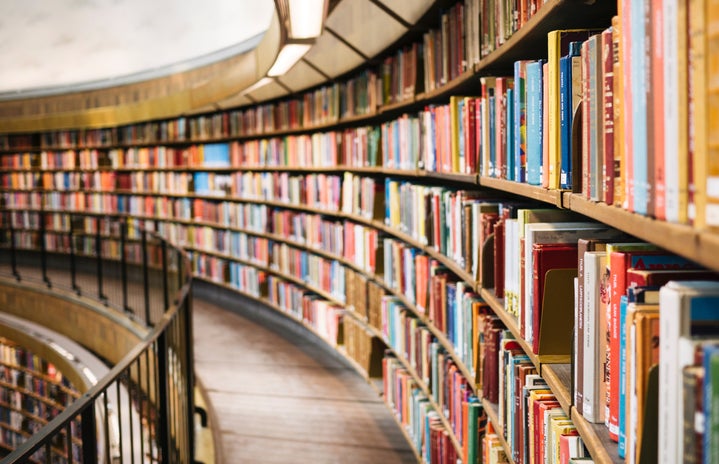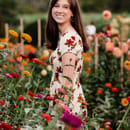The Her Campus National Editors write about products we love and think you’ll love too. Her Campus has affiliate partnerships, so we get a share of the revenue from your purchase. All products are in stock and all prices are accurate as of publication.
It is a truth universally acknowledged that a high school student will be assigned to read a novel at some point during their high school career (I hope someone will notice the Pride and Prejudice reference I threw in there). I read 18 works of literature throughout my high school experience, and while I will never unread some of these works, I can rank them for my own enjoyment. Here is my ranking of every assigned reading I read in high school, with #18 being the worst and #1 being the best:
#18: Lord of the Flies by William Golding
I read Lord of the Flies as a freshman and only finished it out of spite. The concept of adolescent boys attempting to govern themselves on a deserted island and killing each other was not appealing to me then and still isn’t now. Even worse is how Golding loves to spend multiple pages describing something as mundane as the trees in hyperrealist detail. The only memory of reading this book I have is two of my classmates acting out Piggy’s death scene during class. All in all, a very terrible novel about equally terrible schoolboys.
#17: Brave New World by Aldous Huxley
Aldous Huxley doomed himself the moment he decided to formulate a dystopian society based on Freudian theory. I read Brave New World for my AP Literature class during my senior year. The only reason I did not rate this novel last was that A.) I hated Lord of the Flies more, and B.) I see the point Huxley was attempting to make. The government in this society is supposed to be an allegory for fascism, but that is the only legitimate point Huxley makes.
#16: The Adventures of Huckleberry Finn by Mark Twain
I have now realized that male-centered narratives are not my cup of tea. I read The Adventures of Huckleberry Finn during my junior year, and it is the second book on this list that I finished out of spite. I was not intrigued by the concept of a young boy rafting down the Mississippi River and getting into trouble. I also found the novel extremely difficult to read because it’s written in a southern dialect and uses the n-word over 200 times.
#15: The Odyssey by Homer
I read The Odyssey as a freshman, and my inner Percy Jackson kid is the only reason I understood what was going on. Arguably, it was one of the few times a childhood obsession came in handy. Odysseus enrages me because he commits adultery several times on his journey home while his wife has remained faithful. He is incredibly cocky and I understand why the gods tried to kill him as often as they did.
#14: The Great Gatsby by F. Scott Fitzgerald
I now realize that I may be on a tirade against married men who cheat on their wives (I wrote this piece after it came out that Ned from the Try Guys cheated on his wife). The Great Gatsby falls short in its ability to showcase the futility of the American Dream, attempting to do so through Gatsby’s death and the weak symbolism of the green light. The novel itself is about affluent white people partying and committing crimes. I read this during my junior year, and the only definite thing I can say is that there was something between Nick and Gatsby.
#13: The Awakening by Kate Chopin
The Awakening tries so hard to be a piece of feminist literature. The main character desires to be a “free woman” despite living in the nineteenth century. She attempts to free herself of societal expectations for women by spending her time painting and having an affair. However, all she achieves is the ability to be incredibly annoying. I read The Awakening also for my AP Literature class, and the only thing awakened within me was a dislike for this novel.
#12: A Midsummer Night’s Dream by William Shakespeare
I read A Midsummer Night’s Dream as a freshman, and the only thing I remember about this play is that there are faeries. I did enjoy it, however, and the only reason it has a low ranking is that there are better works on this list.
#11: To Kill a Mockingbird by Harper Lee
I actually enjoyed To Kill a Mockingbird, but my big gripe with it is that it’s a novel about racism written by a white woman. I read this during my sophomore year and thought the story was interesting since it was told from a child’s perspective, but it fails to grasp the depth and complexity of the topics it explores. I did like the novel enough to name my dog Scout, but the surface-level depiction of complex topics puts it lower on this list.
#10: Romeo and Juliet by William Shakespeare
I read Romeo and Juliet while finishing up my sophomore year in quarantine. Therefore, I believe my opinions on the play have tarnished because I read it in my pajamas instead of acting it out with lightsabers during class time (yes, this was a real thing my teacher did). I think there is a tendency to classify Romeo and Juliet as either a love story or a cautionary tale when I believe it is a mixture of both. While the titular characters make stupid decisions, they are young and in love, so they deserve some slack, in my opinion.
#9: Macbeth by William Shakespeare
I love anything Scottish and involving swords, so I really appreciated reading Macbeth in my junior year. The descent into madness that Macbeth and Lady Macbeth go through was interesting to see unfold. My class enjoyed discussing this piece. My only gripe is that no one did a Scottish accent when we read aloud during class.
#8: Hamlet by William Shakespeare
Hamlet was the ultimate sad boy, and I stand by this statement. I read Hamlet for AP Literature, and my class spent most of our time hyperfixating on Hamlet’s complicated family tree. Hamlet is probably my favorite Shakespeare that I have read so far, as evidenced by its outranking of the other Shakespeare works on this list.
#7: The Importance of Being Earnest by Oscar Wilde
Any form of literature or media that critiques the wealthy is an automatic “yes” for me. I read The Importance of Being Earnest for AP Literature and enjoyed the combination of humor and social commentary. When my class acted out the play, we used a variety of accents for the characters, from posh English to a Southern twang, which only made this piece more entertaining.
#6: The Things They Carried by Tim O’Brien
The Things They Carried is an anthology of short stories about the author’s experiences as a soldier in the Vietnam War. I read The Things They Carried as a part of my summer assignment for AP Literature. O’Brien beautifully describes the brotherhood and camaraderie amongst his fellow soldiers in stories that leave a lasting impact on the reader.
#5: Night by Elie Weisel
Night is a heart-wrenching memoir of the author’s experiences living through the Holocaust that I read as a sophomore. The prose was hauntingly beautiful and spilled off of the page. At times I had to put the book down because the content was so heavy, but this memoir is definitely worth reading.
#4: The Bell Jar by Sylvia Plath
While I technically chose to read The Bell Jar for an AP Literature assignment, it still counts as assigned reading. A staple of the “sad girl autumn” aesthetic, The Bell Jar explores female mental health and still resonates with readers decades later. I, like many others, saw myself within this book and have carried a piece of it with me since finishing it.
#3: Things Fall Apart by Chinua Achebe
Things Fall Apart was also part of my summer assignment for AP Literature. Achebe is a master at crafting a story that combines a compelling narrative and anti-colonialist sentiments. I highly recommend this book to anyone looking to expand their horizons to more than just Western authors.
#2: A Raisin in the Sun by Lorraine Hansberry
A Raisin in the Sun is another play I read for AP Literature and absolutely loved. It tells the story of a Black family living on the South Side of Chicago in the 1950s. The play only details a few days in their lives, but the characters appear to live and breathe off of the page as if they were real. We also watched the 1961 film adaptation starring Sidney Poitier, which I feel encapsulates the essence of the play.
#1: Their Eyes Were Watching God by Zora Neale Hurston
Without a doubt, Their Eyes Were Watching God is not only the best book I read in high school but easily one of the best books I have ever read. It is true feminist literature, and Kate Chopin wishes she could write something as beautiful as this novel. I cried reading the ending, which marks the first time I cried while reading a book for school. The prose and the story itself are absolutely incredible, and I believe everyone should read Their Eyes Were Watching God at some point in their lives.


